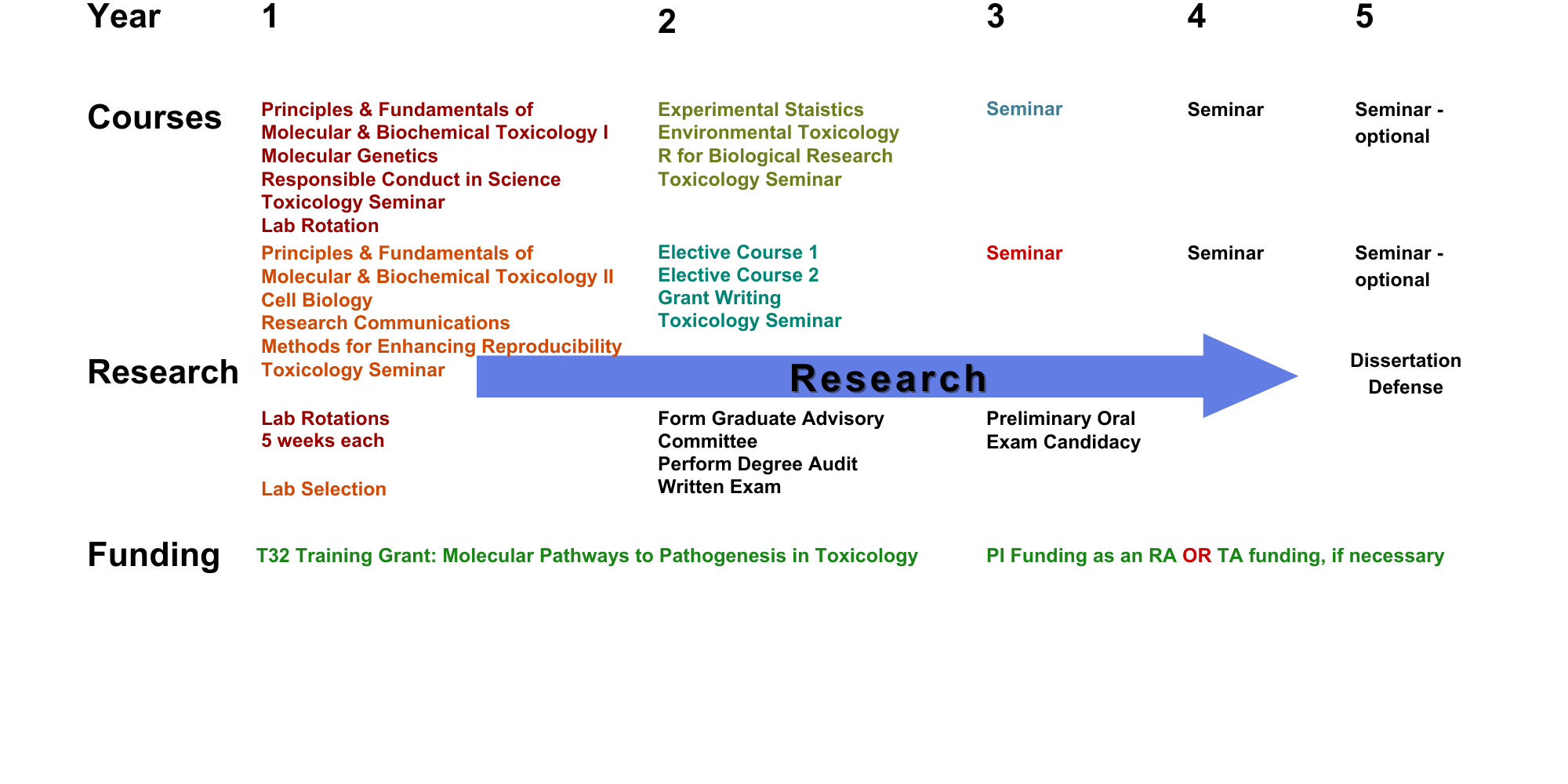Curriculum Map for PhD Students
Core Course Requirements for PhD Students
TOX 701 Principles and Mechanisms of Molecular and Biochemical Toxicology, I (3 CR)
This course covers the general principles of toxicology including xenobiotic dose response relationships, absorption, distribution, elimination, metabolism, excretion, and pharmacokinetic modeling. The course then focuses on the molecular and biochemical basis of toxicant action, first at the cellular level involving cell injury, necrotic cell death, regulated cell death and pathology and then at the organ level involving acute toxicity in the kidney, lung and liver. The course also covers endocrine disruption, mutagenesis, DNA repair and chronic toxicity involving carcinogenesis and the importance of critical windows of exposure.
TOX 702 Principles and Mechanisms of Molecular and Biochemical Toxicology, II (3 CR)
This course covers the biochemical, molecular and cellular mechanisms through which xenobiotics disrupt development and the cardiovascular, immune, nervous, dermal and reproductive systems to produce toxicity and adverse outcomes at the organ/organism level. The course covers emerging contaminants, the role of genetics and epigenetics in individual susceptibility to xenobiotics and the use of “omics’ approaches to study the underlying mechanisms of toxicity. Software packages for omics analysis and databases to advance our understanding of mechanisms will be introduced. Principles of epidemiology and community engagement will be discussed and specialized areas of toxicology including regulatory and industrial toxicology and human health risk assessment will be highlighted.
TOX 715 Environmental Toxicology (3 CR)
Evaluation of fundamental processes relating fate and effects of chemicals in the environment. Emphasis on effects of pollutants on non-human species, environmental risk assessment and historically relevant incidents of environmental contaminants.
GN 701 Molecular Genetics (3 CR)
A discussion of the structure and function of genetic material at a molecular level. Consideration of both prokaryotic and eukaryotic systems. The aim to describe genetics in terms of chemical principles.
ST 511 Experimental Statistics for Biological Sciences (3 CR)
Basic concepts of statistical models and use of samples; variation, statistical measures, distributions, tests of significance, analysis of variance and elementary experimental design, regression and correlation, chi-square.
CBS 770 Cell Biology (3 CR)
Advanced cell and organelle structure and function and recent advances in molecular biology. Emphasis on current literature and application of research procedures.
TOX 801 Toxicology Seminar (1 CR/Semester)
TOX 820 Lab Rotations (1 CR)
TOX 861 Responsible Conduct in Research (1 CR)
TOX 862 Research Communications (1 CR)
TOX 863 Grant Writing (1 CR)
TOX 864 Methods for Enhancing Reproducibility (1 CR)
DSC 595 Introduction to R (1 CR)
Research Requirements for PhD Students
TOX 820 Lab Rotations (1 CR)
Lab rotations for first semester graduate students
TOX 893 Doctoral Supervised Research (Variable Credit)
Instruction in research and research under the mentorship of a member of the Graduate Faculty.
TOX 895 Doctoral Dissertation Research (Variable Credit)
Dissertation research.
TOX 896 Summer Dissertation Research (1 CR)
For graduate students whose programs of work specify no formal course work during a summer session and who will be devoting full time to thesis research.
